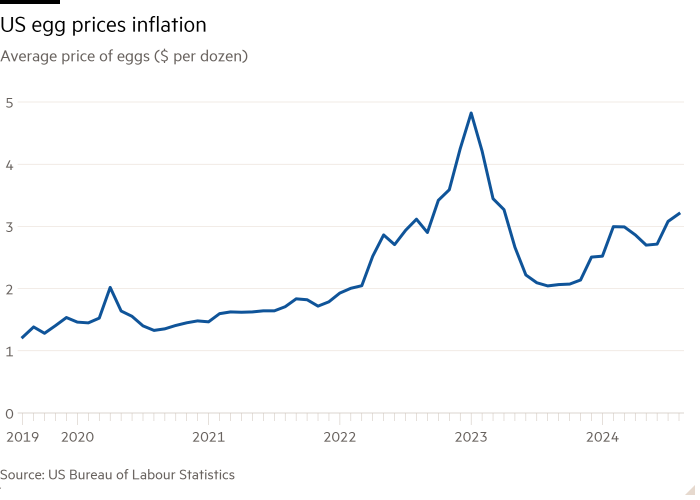Unlock the Editor’s Digest for free
Roula Khalaf, Editor of the FT, selects her favourite stories in this weekly newsletter.
Prices for eggs have soared as devastating bird flu outbreaks around the world and shifting consumer tastes put pressure on supplies.
Global average prices are 60 per cent higher than in 2019, according to analysts at Rabobank, a rapid appreciation has led to political point-scoring by JD Vance on the US election campaign trail. Egg shortages have also created temporary curbs to McDonald’s breakfast service in Australia.
A key factor in surging prices has been the devastating outbreaks of avian flu in North America and Europe, which have led to the culling of tens of millions of laying birds.
Roughly 33mn commercial laying hens and pullets were culled in the US between November 2023 and July this year, hard on the heels of another bird flu outbreak in 2022 that culled 40mn layers, Rabobank found.
“The lingering effects” of bird flu have been compounded by rising demand, said Karyn Rispoli, managing editor of eggs at Expana, a commodity trading data provider.
She said consumers were also switching to eggs as a more affordable source of protein than meat. Concerns about the carbon footprint of meat consumption was also driving demand for eggs, added Rabobank.
These factors had led to Americans paying more than three times as much for eggs today than five years ago, Rabobank said. In comparison, South African egg prices had only doubled in the same period while Russia, Japan, Brazil and Europe and India had experienced prices rises of between 50 and 90 per cent, said Rabobank.
“While prices are higher relatively globally, there are big regional differences,” said Nan-Dirk Mulder, global specialist, Animal Protein with RaboResearch, part of Rabobank. The main exception is China where the industry is suffering from too fast expansion of supply and a relatively weak economy, he added.

Data has indicated that egg lovers in the US have been subject to big swings in the price in recent years. Mulder says producers in the US are also grappling with regulations restricting the sale of eggs between states.
The price of a packet of a dozen eggs peaked at $4.82 in January 2023, as global feed prices spiked in the wake Russia’s invasion of Ukraine. Yet within months they had halved. By August this year they reached $3.02.
The fluctuations drew criticism from Republican vice-presidential candidate JD Vance in the swing state of Pennsylvania this month as he blamed Kamala Harris, the Democrat presidential candidate, for egg price inflation.
Egg sales generally fall in the summer months, but this year retail demand was unusually high, according to Emily Metz, president and chief executive of the American Egg Board.
She added that US farmers were trying to shore up the supply of eggs. “Ideally, we need about one bird for every American,” said Metz, who estimated that the US had about 300mn egg-laying hens for roughly 345mn Americans. “Increasing the flock size to meet demand takes time, but we’re working on it.”
Globally, the avian flu outbreak is hitting other markets, notably Australia, which has led to egg rationing by some supermarkets. In July McDonald’s the global fast food giant, temporarily curbed breakfast service hours in some Australian outlets, reportedly in response to the bird flu egg shortage. McDonald’s Australia did not respond to a request for comment.
In the medium term there are signs of relief for US consumers with wholesale US egg prices falling 49 per cent since August 16, as laying bird stocks recovered.
However, Mulder is cautious as to whether this will translate to much lower prices on the supermarket shelves.
“For the time being, until the end of the year, I think we will continue to see relatively high prices, perhaps a bit lower than now as the stocks rebuild,” he said.
“But as for the future: it all depends on whether there will be further avian influenza outbreaks over the winter — and that’s difficult to predict.”









